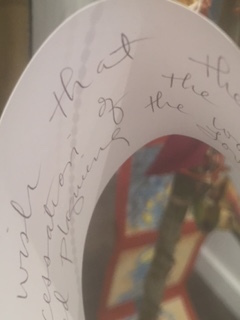Introduction
The cake glows as the celebrant prepares. Eyes closed, a deep inhale, and a monumental effort to blow out every single candle.
Even the most practical person is willing to engage the annual ritual. Not only is there cultural permission to do so, it is often a social expectation. Suspend rational thought for one moment and offer it up.
If you had one wish, what would it be?
As the Institute for Spirituality & Health (ISH) celebrates its 60th year, we asked 60+ people a series of questions related to health and spirituality, including this one. For many, making a wish calls for a willingness to straddle the earthly and the spiritual, which may not be so easy.
Yet everyone was willing to try -- across religion, race, and gender, participants met the question head on.
Offering It Up
"I can't say my wish because then it isn't going to come true." Elaine laughs nervously. That sounds silly, she says. Still. Just in case.
Like many participants, Phoebe self-identifies as spiritually open. She likes Buddhism, and "finds her Zen" in nature. The word spirituality stirs sentiments of love and inspiration; it's a feeling, and it's personal. The question of whether a higher power exists is less pressing for Phoebe than how to cultivate peace internally and throughout the world around her.
Phoebe is ready to say it out loud. "I used to wish for happiness for myself. But instead, every day I wish for true, lasting, consistent, and healthy happiness for everyone I love."
Imagine All the People
For many participants, making a wish intricately involves their loved ones. Parents wish joy for their children, and children wish for their families to be safe.
But children may have more fun. They engage the imagination in a way that adds color and momentum, and use magical powers to outwit the monsters (or at least keep them out).
For adults, the imagination is roomy enough for anxiety and fear to settle in. How we engage the imagination creates the difference between relishing a wish versus worrying about it. Whether by candle, genie, or fairy godmother, making a wish comes with a great sense of responsibility.
Making a personal wish can feel extravagant amidst a world where so many suffer. Many extend their wish to strangers: an end to cruelty and poverty, and more access to education.
"I wouldn't be so naïve as to wish for world peace, I'm a practical person," Jennifer says. "Nobody gets to wish that."
But she does. It feels impossible, yet it's hard to resist. For those who feel the emotional weight of social injustice, wishing for world peace is like a small act of defiance.
"It sounds Miss-America-pageant-y, but I wish that the desire to harm other humans or animals would suddenly be evacuated from humanity," says Laura. "That world leaders would quit being assholes. So I wish for world peace."
The Human Wand
Wishing for world peace feels more reasonable when there is some traction around it. For many, this means cultivating peace one interaction at a time, most notably through daily acts of love or kindness.
In fact, most participants wish for things that can actually happen -- something they can participate in. To wish for something so magical it can never manifest seems to feel more disheartening than powerful.
This reflects psychological research in which wishes are linked to hope, imagination, and as Rollo May points out, motivation. By delving into a wish, and into the imagination, participants weave a tapestry of their internal life and external world - a sort of homage.
"The imagination is the very foundation of our lives," says Sean Fitzpatrick, Director of the Houston Jung Center. "The past, present, and future all live in our imagining of them. Whether or not a wish 'comes true' in the traditional sense, it will reflect psychological truth, and orients us in the world."
Historically, wishes were offered up to the gods; today, it seems we have internalized them. Each wish serves as an intention within our own psyches, a proclamation of gratitude, aspiration, and creativity. Something we grant to ourselves.
Celebrating What We Have
People scan different landscapes: the personal, more immediate world, and the larger one around them. While global suffering can make wishing for personal well-being seem selfish, it can also make it more imperative. Because without internal peace, a sense of connection to the greater scheme feels tenuous.
"My big, selfish one wish right now is to find peace and contentment with who I am and with what I am doing with my life. Without so much worry," says Samantha, an active 40-something mom.
Samantha's wish is mirrored by many of her peers, who elaborate: to be free from anxiety. To live longer. To matter. It is not about turning back time as much as it is about having more time to love, enjoy life, and compassionately integrate years of varied experiences.
This is an important distinction. Wishing for a "do-over" essentially diminishes one's life, and everything along the way. Learning from life is a way of honoring it -- the mistakes, triumphs, and relationships.
"Maybe when you have so much, you don't want to wish for more," says Kate. "I have worked hard to get here. But if I had one wish, and it chokes me up every time, I wish that I could have had that original family unit for my kids. But it doesn't take away from my life now."
What participants don't wish for: a billion dollars. Money was noticeably absent in most of these conversations. Exceptions emerge among those who have experienced intense financial struggle or cultural oppression, where wealth symbolizes a lost freedom or struggle.
These are narratives of meaning, reconciliation, and reverence.
Look closely at a wish, and we see into a person's life and spirit. The pause, the expression in their face, and the narrative they share to get there.
